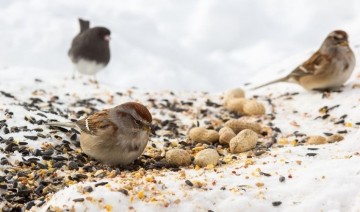
Wild Bird Diets in Winter
Wild birds have a rich and varied diet in spring, summer, and autumn when different foods are abundant, from buds, blossoms, and nectar to seeds, fruits, insects, nuts, and grain. But what do wild birds eat in winter when snow and ice hide many foods, and what foods can you offer at your feeders to provide superior nutrition to your feathered friends?
Natural Foods for Wild Birds in Winter
There are more natural foods available for wild birds in winter than many people realize. Before the ground freezes in late fall or early winter, bluebirds and other thrushes will dig into the soil and root through leaf litter to find hidden insects. Fallen leaves will also hide seeds, windfall fruit, and other foods for many ground-foraging birds such as quail and doves. Chickadees and nuthatches are adept at finding insects and seeds on plants throughout the winter, while sparrows forage for fallen seeds and grain. Abundant nuts such as acorns, hickory nuts, and hazelnuts are favorite foods of jays, woodpeckers will peck into tree bark to release sap even in winter, and waxwings will strip trees of any remaining fruit and berries. Raptors hunt for prey throughout the year, and many birds such as crows, ravens, and magpies will feast on roadkill and other carrion.
Best Foods for Your Winter Backyard Birds
Despite the abundance of natural foods, heavy snowfalls and ice storms can make it difficult for wild birds to find adequate food during the harshest winter months. Providing backyard foods that are high in fat and calories can help birds endure cold temperatures and survive long, freezing nights. The top foods to provide winter backyard birds include…
- Suet – These rich blocks of fat mixed with seed, bits of fruit, and dried insects are a favorite food for winter woodpeckers, nuthatches, chickadees, bluebirds, bushtits, and many other birds.
- Sunflower Seed – The best seed option for a wide range of birds, whole sunflower seeds or sunflower hearts will both attract a wide range of winter birds, including cardinals.
- Nyjer – This small, oil-rich seed is an ideal option for winter finches, including pine siskins, common redpolls, American goldfinches, and purple finches.
- Millet – White proso millet is rich in carbohydrates and provides great winter energy for many small buntings, titmice, and finches that visit backyard feeders.
- Peanuts – Whole peanuts are a popular treat for jays, nutcrackers, wrens, and magpies, while shelled peanut hearts are sure to attract hungry nuthatches, titmice, and woodpeckers.
- Peanut Butter – Smearing peanut butter on a tree trunk or offering it in flavored suet is a delicious option for nuthatches, wrens, bluebirds, brown creepers, and small woodpeckers.
- Cracked Corn – High in carbs to provide quick energy on cold days, cracked corn is a great food for quail, wild turkeys, doves, ducks, and other ground-feeding birds.
Tips for Feeding Winter Birds
No matter what foods you are offering or which winter birds enjoy your buffet’s bounty, there are ways to adjust your feeding station to provide nutritious food even during stormy winter days so no bird goes hungry.
- Use large-capacity feeders to accommodate hungry flocks so more birds can feed at once.
- Install broad covers and baffles to keep the feeders and perches free from snow and ice.
- Fill feeders several days before storms so birds can feed easily before poor weather begins.
- Toss some seed below patio tables or deck edges so ground-feeding birds can forage easily.
- Clean off feeders immediately after storms so birds can quickly replenish their energy.
- Decorate trees and bushes with popcorn, cereal, and berry garlands for festive feeders.
- Store extra seed in sturdy, rodent-proof containers in a cool, dark location.
Beyond the Feeders
While offering food to wild birds in winter is essential to help keep your feathered friends well fed, providing for their water and shelter needs is equally important. A heated bird bath can provide fresh, clean, liquid water even on the coldest days, or you can add an immersible heater (rated for outdoor use) to an existing bird bath to prevent excessive ice buildup. This will ensure birds can stay hydrated without needing to eat ice or snow, which can use up too many calories or cause dangerous chills.
Good shelter will also help protect winter birds from poor weather and hungry predators. Evergreen landscaping arranged in tiers is great natural shelter, or you can build a brush pile from autumn prunings or discarded Christmas trees for instant shelter. Bird roost boxes or convertible bird houses will also help small birds stay safe and comfortable through winter nights and stormy days.
By understanding the winter diets of wild birds and how to meet their dietary needs with the best winter foods, as well as what other resources birds need through the season, you can easily nurture an amazing flock of winter guests to enjoy all season long.

